1. The Excellence Habit — Vlad Zachary
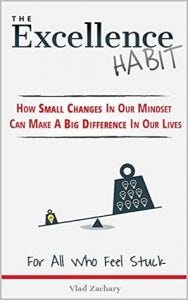
Rating: 6/10
Date of reading: 31st of December 2016–2nd of January, 2017
Description: “Give me a lever long enough and I will move the world!”
Impression: How small changes can affect your life in big ways. This is like a butterfly effect which actually works. The book focuses on creating the habit of excellence and it states that you need to have it in the areas which you deem the most important in your life. Success is closely tied with results while excellence, on the other hand, is tied with a process (a habit). You can control the second, not the first.
Quotes: If we met a poor person a hundred years ago, we would likely call them unfortunate. Back then, we would describe them as someone who did not have enough fortune, who was not lucky enough.
Nowadays, we would not be surprised to hear someone at the bottom of society called a loser. I think we can all agree that there is a big difference between unfortunate and a loser. As society we have evolved to believe less in God and more in ourselves. We are in the driver’s seat of our lives, and, therefore, we own both success and failure. On a personal level, this has made it more difficult to feel good about our current level of success. By accepting the idea that we could achieve anything, we have increased the pressure on ourselves to do it. Paradoxically, this makes it more difficult to reach our goals.
Success is about results. Excellence, on the other hand, is about the process.
We need to be brutally honest with ourselves and to leave our comfort zones. This means doing things we are not very good at. Or, not good at, yet. And, this means doing them now. There is no better time than now. We will never be ready. If we reach “ready,” this means we are comfortable. The point of this is to move outside of our comfort zone and learn to be productive, while there. Then do it again, and again, and again. Until we build it into a habit. That would be an Excellence Habit.
2. The Power Of Habit — Charles Duhigg
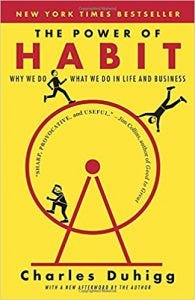
Rating: 8/10
Date of reading: 30th of January — 6th of February, 2017
Description: Every single habit has the same three-part structure. Cue — which is the signal to the start the routine, Routine — which is the internal or external action that we perform, and the Reward — the moment when you receive an internal of external reward for your behavior.
Impression: This is the basic knowledge you need to have when it comes to habits. Even though there are other books who are more user-friendly when it comes to habits, The Power Of Habit is a classic because of simple statements and referenced research.
Quotes: This explains why habits are so powerful: They create neurological cravings. Most of the time, these cravings emerge so gradually that we’re not really aware they exist, so we’re often blind to their influence. But as we associate cues with certain rewards, a subconscious craving emerges in our brains that starts the habit loop spinning
“Foaming is a huge reward,” said Sinclair, the brand manager. “Shampoo doesn’t have to foam, but we add foaming chemicals because people expect it each time they wash their hair. Same thing with laundry detergent. And toothpaste — now every company adds sodium laureth sulfate to make toothpaste foam more. There’s no cleaning benefit, but people feel better when there’s a bunch of suds around their mouth. Once the customer starts expecting that foam, the habit starts growing.”
What Alcoholics Anonymus provides instead is a method for attacking the habits that surround alcohol use. AA, in essence, is a giant machine for changing habit loops. And though the habits associated with alcoholism are extreme, the lessons AA provides demonstrate how almost any habit — even the most obstinate — can be changed.
3. Stumbling On Happiness — Daniel Gilbert
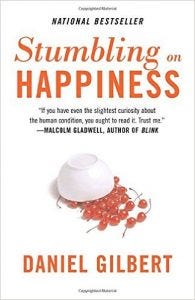
Rating: 9/10
Date of reading: 10th — 20th of March, 2017
Description: How to be happy in a weird and effective way, provided with crazy examples and written by the most respected professor, scientist, and researcher Daniel Gilbert.
Impression: You have books on psychology which are quite boring, dry, unimaginative, and uninspiring. And then you have Daniel Gilbert. If you have to read just one book about how our minds work, it would be this one.
Quotes: Whatever you are thinking, your thoughts are surely about something other than the word with which this sentence will end.
But even as you hear these very words echoing in your very head, and think whatever thoughts they inspire, your brain is using the word it is reading right now and the words it read just before to make a reasonable guess about the identity of the word it will read next, which is what allows you to read so fluently.
Any brain that has been raised on a steady diet of film noir and cheap detective novels fully expects the word night to follow the phrase It was a dark and stormy, and thus when it does encounter the word night, it is especially well prepared to digest it.
As long as your brain’s guess about the next word turns out to be right, you cruise along happily, left to right, left to right, turning black squiggles into ideas, scenes, characters, and concepts, blissfully unaware that your nexting brain is predicting the future of the sentence at a fantastic rate. It is only when your brain predicts badly that you suddenly feel avocado.
That is, surprised. See?
4. Sapiens — Yuval Noah Harari
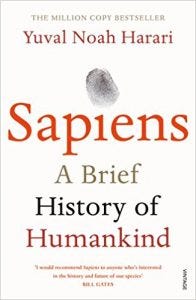
Rating: 10/10
Date of reading: 2nd — 16th of April, 2017
Description: How did we go from the African savannah to today’s civilized world, written in the funniest possible way. You will learn how we (probably) formed religion, why are we the only surviving species of people (there were 7 types of humans on Earth), how our culture and language formed and why gossip is so important with humans.
Impression: This book will make you disagree with the author on at least one page of the book. Nonetheless, it’s truly a gem worth reading and I recommend it highly.
Quotes: Large numbers of strangers can cooperate successfully by believing in common myths.
Most human-rights activists sincerely believe in the existence of human rights.
No one was lying when, in 2011, the UN demanded that the Libyan government respect the human rights of its citizens, even though the UN, Libya and human rights are all figments of our fertile imaginations.
In a one-on-one brawl, a Neanderthal would probably have beaten a Sapiens. But in a conflict of hundreds, Neanderthals wouldn’t stand a chance.
5. The Road Less Traveled — M. Scott Peck
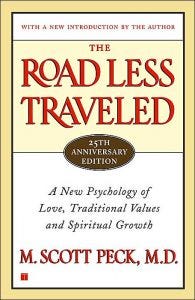
Rating: 9/10
Date of reading: 30th of April — 10th of May, 2017
Description: The road less traveled in life. The categories like love, parenting, religion, life’s purpose, and self-development. Even though the book was written back in the ’70s, it’s a gem worth reading.
Impression: I remember and use quite a lot from this book. The difference between loneliness and aloneness, the paradox that life is easy once you accept that it’s hard, that the Hero’s Journey matter even though you come back to the same place. This is a really great book and definitely worth reading.
Quotes: Problems do not go away. They must be worked through or else they remain, forever a barrier to the growth and development of the spirit.
In attempting to avoid the pain of responsibility, millions and even billions daily attempt to escape from freedom.
“I just told you I can’t live without him [or her].” I try to explain: “What you describe is parasitism, not love. When you require another individual for your survival, you are a parasite on that individual. There is no choice, no freedom involved in your relationship. It is a matter of necessity rather than love. Love is the free exercise of choice. Two people love each other only when they are quite capable of living without each other but choose to live with each other.”
To fail to confront when confrontation is required for the nurture of spiritual growth represents a failure to love equally as does thoughtless criticism or condemnation and other forms of active deprivation of caring.
6. The Six Pillars Of Self-Esteem — Nathaniel Branden
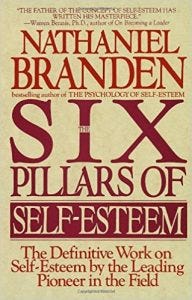
Rating: 6/10
Date of reading: 11th — 26th of May, 2017
Description: The six pillars of self-esteem are: living consciously, self-acceptance, self-responsibility, self-assertiveness, living purposefully, and personal integrity
Impression: You will learn what true self-esteem is, how to grow and keep it, and learn the pitfalls of”fake it ‘till you make it” bullshit type of advice.
Quotes: The question is sometimes asked, “Is it possible to have too much selfesteem?”
No, it is not; no more than it is possible to have too much physical health or too powerful an immune system. Sometimes selfesteem is confused with boasting or bragging or arrogance; but such traits reflect not too much self-esteem, but too little; they reflect a lack of self-esteem. Persons of high self-esteem are not driven to make themselves superior to others; they do not seek to prove their value by measuring themselves against a comparative standard. Their joy is in being who they are, not in being better than someone else.
Self-esteem is not a substitute for a roof over one’s head or food in one’s stomach, but it increases
the likelihood that one will find a way to meet such needs.
7. Thinking, Fast and Slow — Daniel Kahneman
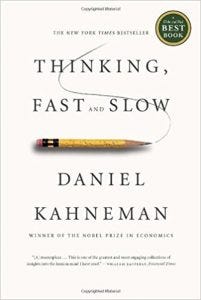
Rating: 9/10
Date of reading: 19th — 27th of June, 2017
Description: We have two brains which Kahneman calls System 1 — the fast, intuitive thinking system, and System 2 — the slow, analytical thinking system. The trick is recognizing when we need to use the first and when the second one. Spoiler — we are terribly bad at using the systems when we need to use them.
Impression: This book should be a manual to everyone in the world. It will teach you to notice our brain’s faulty thinking, both in intuition and in analytics. The concepts I quite commonly use from the book are “WYSIATI- or What You See Is All There Is” — a way of thinking about the world from our limited personal experience; and the phrase coined as the Focusing Illusion — Nothing in life is as important as you think it is while you’re thinking about it.
Quotes: People tend to assess the relative importance of issues by the ease with which they are retrieved from memory — and this is largely determined by the extent of coverage in the media.
The situation has provided a cue; this cue has given the expert access to information stored in memory, and the information provides the answer. Intuition is nothing more and nothing less than recognition.
For an example, here is a simple puzzle. Do not try to solve it but listen to your intuition:
A bat and ball cost $1.10.
The bat costs one dollar more than the ball.
How much does the ball cost?
A number came to your mind. The number, of course, is 10: 10¢. The distinctive mark of this easy puzzle is that it evokes an answer that is intuitive, appealing, and wrong. Do the math, and you will see. If the ball costs 10¢, then the total cost will be $1.20 (10¢ for the ball and $1.10 for the bat), not $1.10. The correct answer is 5¢. It%”>5¢. is safe to assume that the intuitive answer also came to the mind of those who ended up with the correct number — they somehow managed to resist the intuition.
8. One Small Step Can Change Your Life: The Kaizen Way — Robert Maurer
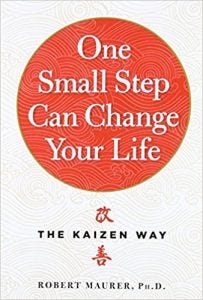
Rating: 6/10
Date of reading: 28th — 30th of June, 2017
Description: Kaizen is a Japanese phrase which means continuous improvement. The book shows us how to change our lives by using the Kaizen method, starting from the tiniest possible steps. And it works.
Impression: This is something I use in my daily life with writing and reading habits. The brain is about how many times you do something (consistency), not about how hard or long you do it (intensity). Heck, this article was made possible because I just started reading 20 pages of a book a day. And it became a reality because I sat down every single day and wrote just 500 words of it.
Quotes: “When you improve a little each day, eventually big things occur. When you improve conditioning a little each day, eventually you have a big improvement in conditioning. Not tomorrow, not the next day, but eventually a big gain is made. Don’t look for the big, quick improvement. Seek the small improvement one day at a time. That’s the only way it happens and when it happens, it lasts. “
No Time, No Money? Kaizen Fits Your Life.
9. Start With Why — Simon Sinek

Rating: 8/10
Date of reading: 20th — 30th of December, 2017
Description: The book describes the Golden Circle — the Why (Why you do what you do), the How (How you do what you do), and What (What you actually do). All companies know what they do, some companies know how they do it, but only a handful of them know why they do what they do. The secret lies in leading with why you do what you do.
Impression: I remember hearing about the Golden Circle years ago. Ever since, I’ve been using it in my presentations and lectures. It’s a remarkable concept which you can implement in business, friendships, and even dating.
Quotes: When fear is employed, facts are incidental. Deeply seated in our biological drive to survive, that emotion cannot be quickly wiped away with facts and figures. This is how terrorism works. It’s not the statistical probability that one could get hurt by a terrorist, but it’s the fear that it might happen that cripples a population.
If fear motivates us to move away from something horrible, aspirational messages tempt us toward something desirable.
10. The Hero With A Thousand Faces — Joseph Campbell
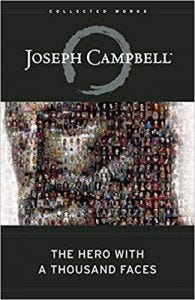
Rating: 8/10
Date of reading: 6th — 19th of March, 2018
Description: Is it a bird? Is it a plane? No, it’s the guy who was sitting in his shed for 5 years and read all mythology stories ever written by humans. Oh, and he found 14 points which all the mythological stories share together. And guess what? George Lucas found this book and created the Star Wars story arc according to these points. Afterward, all great movies started using “The Hero’s Journey” to create compelling stories which we will remember for years to come (think Frodo, Harry Potter, Luke Skywalker, Neo, etc.)
Impression: The book was written back in 1948. and has plenty of story references from the old books so it’s quite difficult to read. But if you can read it, the results will be 10x of your effort. The story arc that you learn and the millennia-old conflicts will help you become a better creative no matter what you do. You will understand the human psyche and how conflicts come to life and you will use that in your creative works. A must-read for any storyteller.
Quotes: It appears that “culture at edge of utter corruption” and “world at the edge of utter destruction” are two of the oldest themes to be found in stories of the human race.
Through these perils and more, he learns the way home is mazed with hazards that force him to take chances and to make choices — and he learns to not fall asleep. All that he endures is also presented to human beings in the same way during times of duress. One either forgets one’s spiritual commitment and is thereby blown farther from true home, or else one becomes, in those moments, more determined to fulfill the question, to become more expansive, more docile, more fierce — whatever is required — than one had been just moments before.
11. Evolutionary Psychology — David Buss
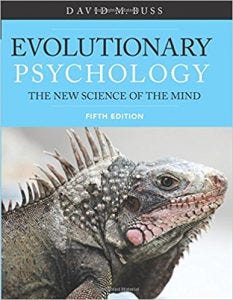
Rating: 5/10
Date of reading: 12th of May — 1st of June, 2018
Description: How the human brain evolved over hundreds of thousands of years to become what it is today. And it’s a miracle how our brain thinks we still live in the era of sabertooth cats and mammoths and, therefore, acts, thinks, and behaves like the treat of those is real. Read this to understand our brains and why it operates the way it does in the world today.
Impression: The book is quite long and dry, with plenty of data and research. But if you’re new to evolutionary psychology, it’s a great guidebook to read. It takes the elementary research and inserts it into the book so you won’t get diluted or watered-down concepts. It’s the real deal.
Quotes: The male pipefish seahorse receives the eggs from the female and then carries them around in his kangaroo-like pouch. These females compete aggressively with each other for the “best” males, and males in turn are choosy about who they mate with. This so-called “sex-role reversed” species supports Trivers’s theory, showing that it is not “maleness” or “femaleness” itself that causes the sex difference in choosiness; rather, it is the relative parental investment of the two sexes.
Consider a carpenter’s toolbox. The carpenter gains flexibility not by having one “highly general tool” that can be used to cut, poke, saw, screw, twist, wrench, plane, balance, and hammer. Instead, the carpenter gains flexibility by having a large number of highly specific tools in the toolbox
12. True Believer — Eric Hoffer

Rating: 9/10
Date of reading: 5th — 16th of July, 2018
Description: The book explains the true nature of groups and mass movements. How people behave in groups, why they behave like that, and what you need to pay attention to avoid the many pitfalls of a revolutionary group or a political movement. The book teaches you also about the effects of hope and criticism on mass movements and how the group rules are rarely (if ever) broken, even though they might seem illogical and confusing.
Impression: There is a great quote which says “Man is Smart. Men are Stupid” which kind of describes this book. We people tend to become quite stupid and gullible when we are in a group. Luckily for us, there are rules to which we adhere to when we are in a collective and this book studied those rules. Closest thing to a collective “mind-reading.”
Quotes: On the other hand, extravagant hope, even when not backed by actual power, is likely to generate a most reckless daring. For the hopeful can draw strength from the most ridiculous sources of power — a slogan, a word, a button. No faith is potent unless it is also faith in the future; unless it has a millennial component. So, too, an effective doctrine: as well as being a source of power, it must also claim to be a key to the book of the future.
Those who would transform a nation or the world cannot do so by breeding and captaining discontent or by demonstrating the reasonableness and desirability of the intended changes or by coercing people into a new way of life. They must know how to kindle and fan an extravagant hope.
The less justified a man is in claiming excellence for his own self, the more ready is he to claim all excellence for his nation, his religion, his race or his holy cause.
13. Atomic Habits — James Clear
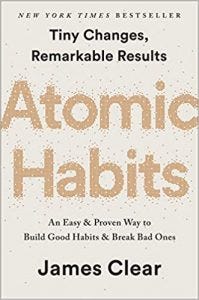
Rating: 9/10
Date of reading: 16th — 22nd of October, 2018
Description: How small changes in daily actions establish habits and how those habits, over time, change your life drastically. James Clear writes a personal development blog for years and his work is remarkable.
Impression: Before this book came out, there was a trifecta of habit building and breaking books. Now, there is a fourth player in town. The best thing I got from this book was the Sorites Paradox which explains how you can’t pinpoint a single small action which changed you (going to the gym), but how all of those small actions combined changed your life (I didn’t become fit after one gym session, but after 50 or so, I did become fit. The 50th gym session wouldn’t make me fit without the other 49 gym sessions.)
Quotes: Naval Ravikant has said, “To write a great book, you must first become the book.” I originally learned about the ideas mentioned here because I had to live them. I had to rely on small habits to rebound from my injury, to get stronger in the gym, to perform at a high level on the field, to become a writer, to build a successful business, and simply to develop into a responsible adult. Small habits helped me fulfill my potential, and since you picked up this book, I’m guessing.
Imagine that you have an ice cube sitting on the table in front of you. The room is cold and you can see your breath. It is currently twenty-five degrees. Ever so slowly, the room begins to heat up.
Twenty-six degrees.
Twenty-seven.
Twenty-eight.
The ice cube is still sitting on the table in front of you.
Twenty-nine degrees.
Thirty.
Thirty-one.
Still, nothing has happened.
Then, thirty-two degrees. The ice begins to melt. A one-degree shift, seemingly no different from the temperature increases before it, has unlocked a huge change.
You can read our Book Summary on Atomic Habits.
14. Peak — Anders Ericsson
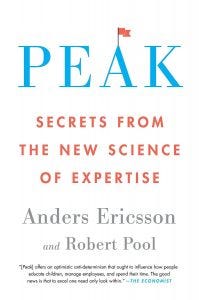
Rating: 7/10
Date of reading: 15th — 21of November, 2018
Description: Talent play no role in someone becoming an expert in his or her domain. The only thing that makes an expert in any domain is deliberate practice. Anders Ericsson tried, for 30 years, to find just one person who became an expert in a domain without using the principles of deliberate practice and just with talent or geniusness itself. He found zero people like that.
Impression: Talent is useful because it nudges in you a certain direction, but when it comes to the grand scheme f things, it’s irrelevant. A person becomes an expert (master) in his domain by only using deliberate practice for a long period of time (10,000 hours popularized by Malcolm Gladwell in Outliers).
Quotes: But we now understand that there’s no such thing as a predefined ability. The brain is adaptable, and training can create skills — such as perfect pitch — that did not exist before. This is a game changer, because learning now becomes a way of creating abilities rather than of bringing people to the point where they can take advantage of their innate ones. In this new world it no longer makes sense to think of people as born with fixed reserves of potential; instead, potential is an expandable vessel, shaped by the various things we do throughout our lives. Learning isn’t a way of reaching one’s potential but rather a way of developing it. We can create our own potential.
While the principles of deliberate practice were discovered by studying expert performers, the principles themselves can be used by anyone who wants to improve at anything, even if just a little bit. Want to improve your tennis game? Deliberate practice. Your writing? Deliberate practice. Your sales skills? Deliberate practice. Because deliberate practice was developed specifically to help people become among the best in the world at what they do and not merely to become “good enough,” it is the most powerful approach to learning that has yet been discovered
